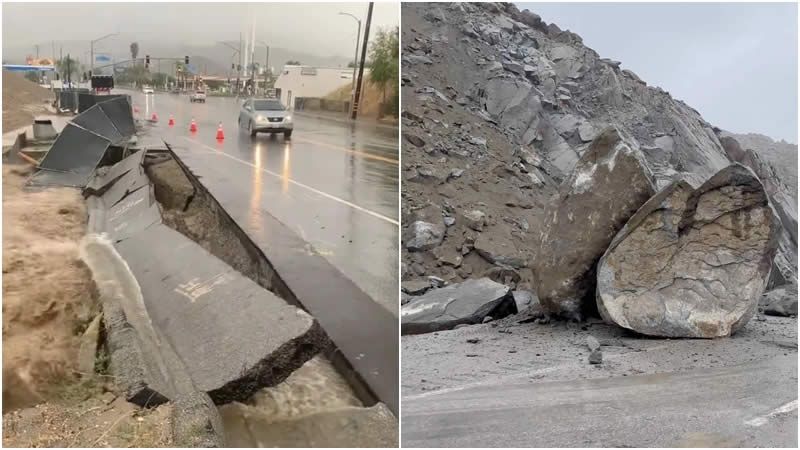As the remnants of one-time Hurricane Hilary continued to affect the Southwest, regions including Southern California braced for further impact on Monday morning. With the possibility of additional flash flooding, mudslides, and rockslides, meteorologists warned of potentially perilous conditions. The National Hurricane Center issued a stark warning, highlighting the potential for “life-threatening and locally catastrophic” flooding.
Initially intensifying to a Category 4 hurricane, Hilary weakened to a tropical storm before making landfall on Sunday and subsequently further weakened to a subtropical cyclone on Monday morning. The storm had already triggered flooding in multiple areas and caused numerous rock and mudslides.
Remarkably, Hilary marked the first tropical storm to strike Southern California in 84 years, leaving its mark by depositing more than half the average annual rainfall in certain desert and mountainous regions. Palm Springs received nearly 3 inches of rain by Sunday evening. The storm’s impact left tens of thousands without power across Southern California, while Palm Springs even lost its 911 service on Sunday night, reported Weather.
The National Hurricane Center warned of Hilary’s lasting influence, stating, “Intense heavy rainfall associated with Hilary is expected across the Southwestern United States through early Monday morning. Rainfall amounts of 3 to 6 inches, with isolated maximum amounts of 10 inches, are expected across portions of southern California and southern Nevada, leading to dangerous to catastrophic flooding.”
Moreover, Oregon and Idaho faced the prospect of receiving 1 to 3 inches of rain, with localized areas potentially getting up to 5 inches through Tuesday, which could result in localized and significant flash flooding.
In Nevada, concerns lingered about potential dangerous flooding in the western Mojave Desert, an occurrence described as exceedingly rare by the NWS Las Vegas on Sunday.
Southern California, including Los Angeles and surrounding counties, endured heavy rainfall, as reported by Los Angeles Times. Ventura County experienced life-threatening flooding, while San Bernardino, Riverside, and the adjacent mountains faced a high risk of flash floods. Evacuation orders were issued for San Bernardino and Riverside Counties, along with evacuation warnings in Orange County.
Meanwhile, the Inland Empire and mountainous areas faced an elevated risk of flash flooding, with certain communities anticipated to receive 6 to 10 inches of rain, according to the New York Post.”



